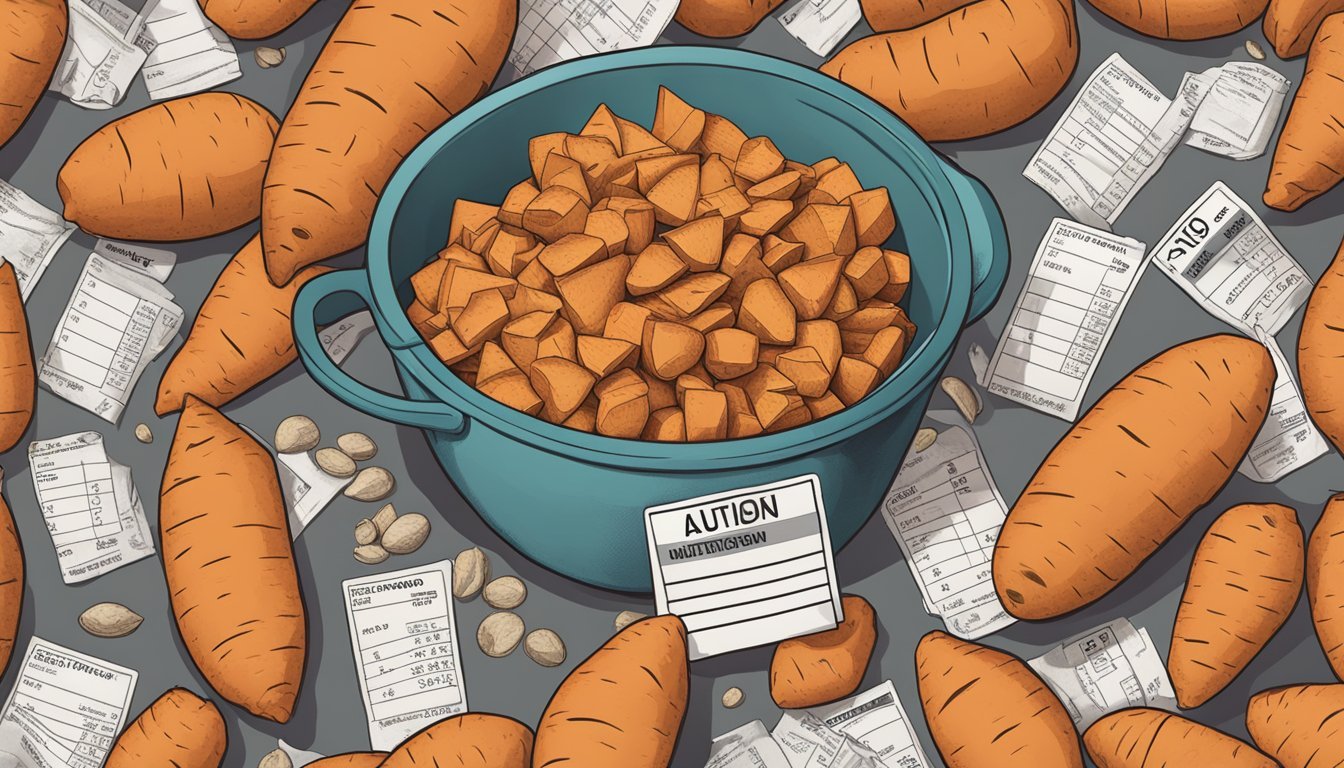How Much Sweet Potato Per Day Is Excessive?
Understanding Safe Limits
Sweet potatoes are a nutritious addition to a balanced diet, prized for their high fiber content, vitamins, and minerals. They are particularly rich in beta-carotene, which the body converts into vitamin A, essential for vision, immunity, and skin health. However, as with any food, there is a threshold for how much sweet potato consumption is beneficial before it may become excessive and lead to potential health issues.
While incorporating sweet potatoes into daily meals can contribute to a healthy diet, excessive intake of any single food, including sweet potatoes, can disrupt nutritional balance and cause adverse health effects. One of the concerns with overconsumption of sweet potatoes is the potential for vitamin A toxicity, an issue that arises from storing excess amounts of preformed vitamin A in the liver.
Determining the right amount of sweet potato to consume requires consideration of individual dietary needs, existing health conditions, and overall balance of nutrients in one's diet. Registered dietitians and healthcare providers can offer personalized advice to ensure that sweet potatoes contribute positively to one's nutritional well-being without exceeding safe consumption levels.
The Basics of Sweet Potatoes
Sweet potatoes are a nutrient-dense root vegetable known for their sweet taste and vibrant orange color. Recognized for their health benefits, they are a source of essential vitamins, minerals, and other nutrients.
Nutritional Profile
Sweet potatoes are an outstanding source of vitamin A, with a single 100-gram serving providing the recommended daily amount, primarily in the form of beta carotene. They are also high in vitamins C and B5, potassium, and dietary fiber, which aids digestion. The vegetable provides a moderate amount of protein and is naturally low in fat. With their high antioxidant content, sweet potatoes contribute to reducing oxidative stress and inflammation.
Nutrient Amount in 100g of Sweet Potato Calories 86 Carbohydrates 20.1g Fiber 3g Protein 1.6g Fat 0.1g Vitamin A 709 µg (79% DV) Vitamin C 2.4 mg (3% DV)
Varieties of Sweet Potatoes
There are several varieties of sweet potatoes, varying in skin and flesh color, ranging from white and yellow to orange and purple. The orange-fleshed variety is most common in the United States. The purple sweet potato is noted for having higher antioxidant levels. The nutritional content can slightly vary between these varieties, adjusting their vitamin and mineral profiles.
Sweet Potatoes vs. Regular Potatoes
Sweet potatoes and regular potatoes differ nutritionally. Sweet potatoes contain more fiber and vitamins, especially vitamin A. They have a lower glycemic index, which means they have a slower impact on blood sugar levels. Regular potatoes provide more potassium but lack the significant vitamin A content that sweet potatoes offer. Both contribute essential nutrients to the diet, but sweet potatoes are often considered the more nutritionally dense option.
Health Benefits of Sweet Potatoes
Sweet potatoes, particularly the orange and purple varieties, offer a rich bundle of health benefits. They are an excellent source of vitamin A through their high beta-carotene content, an essential nutrient for eye health. The body can convert beta-carotene into vitamin A, vital for maintaining healthy vision, supporting the immune system, and fostering good skin health.
Additionally, sweet potatoes are abundant in vitamin C and potassium, which play roles in healing wounds and maintaining heart function. The fibrous nature of sweet potatoes makes them beneficial to gut health, as they help maintain a robust digestive tract. Further, these tubers offer a moderate glycemic index, which aids in blood sugar regulation and could be suitable for individuals managing diabetes.
Beyond their vitamin content, sweet potatoes are packed with antioxidants that contribute to the body's anti-inflammatory properties, possibly reducing the risk of chronic diseases such as heart disease and cancer.
Vitamin A: Promotes eye health and supports the immune system
Vitamin C: Enhances iron absorption and wound healing
Potassium: Regulates blood pressure and heart function
Fiber: Aids in digestive health and can stabilize blood sugar levels
In sum, the vibrant color in orange sweet potatoes is attributed to their rich carotenoid content, with antioxidant capabilities that protect the body's cells from damage. Purple sweet potatoes also contain these antioxidants and have high anti-inflammatory properties. Regular consumption of sweet potatoes contributes to a wealth of health benefits, making them a valuable addition to a balanced diet.
Daily Sweet Potato Intake
Sweet potatoes are a nutrient-dense food, offering a rich supply of vitamins and minerals with relatively low calories. However, portion sizes are crucial to avoid potential negative effects from overconsumption.
Recommended Portion Sizes
A single serving of sweet potato is typically a medium-sized root, about 5 inches long. This serving size contains roughly:
Calories: 100-160 calories
Carbs: 23-37 grams
Sugar: 5-7 grams (depending on the variety)
Fat: 0.1-0.2 grams
Dietary Fiber: 3-5 grams
Dietary guidelines suggest filling one-quarter of your plate with starchy vegetables like sweet potatoes. Adults should aim for at least 130 grams of carbohydrates daily, while the total daily calorie intake can range from 1,600 to 3,000 calories depending on age, sex, and level of activity.
Effects of Overconsumption
Consuming sweet potatoes in excess can lead to several issues:
Energy Surplus: High intake contributes to an energy surplus, potentially leading to weight gain if the calories consumed surpass the body's energy expenditure.
Vitamin A Toxicity: Overindulgence in sweet potatoes might result in hypervitaminosis A due to their high beta-carotene content, which the body converts to vitamin A.
Blood Sugar Spikes: Despite their complex carbs and fiber, large portions can still affect blood sugar levels, which is a concern for individuals with diabetes.
Nutrient Imbalance: Focusing too heavily on one food can lead to a lack of variety in the diet, which is necessary for a balance of nutrients.
Preparation Methods and Their Impact on Nutrients
When preparing sweet potatoes, the method used can significantly impact the nutrient profile of the final dish. Roasting and baking sweet potatoes are similar techniques that often maintain a high level of nutrients since they require no water, which can leach out water-soluble vitamins. Roasting at high temperatures can also caramelize the natural sugars, enhancing flavor without the need for added fats.
Boiling sweet potatoes is a common practice, but it has the potential to cause some nutrient loss. Vitamins that are water-soluble, such as vitamin C, can leach into the water. However, starting with cold water and cubing the potatoes can reduce cooking time and nutrient loss.
Steaming sweet potatoes is a gentle cooking technique that can help preserve vitamin content and is considered one of the best methods for nutrient retention.
Frying, while it can make for a crispy and tasty treat, often adds substantial fat without a corresponding increase in other nutrients. Use of oil can significantly increase the calorie content, so it's less frequently recommended for those looking to maximize the nutritional benefits of sweet potatoes.
Here's a comparison of different preparation methods:
Cooking Technique Nutrient Retention Added Fat Roast/Bake High Low Boil Medium None Steam High None Fry Low High
The choice of cooking techniques also needs to fit with the recipe and desired texture of the sweet potato dish. While each technique has its benefits and drawbacks, steaming and baking are generally preferred for maximum nutrient retention.
Sweet Potatoes in Certain Diets
Individuals managing diabetes may incorporate sweet potatoes into their diets due to the vegetable's fiber content and lower glycemic index compared to regular potatoes. They contain both soluble and insoluble fiber, which can help regulate blood glucose levels. However, portion size is important to avoid excessive carbohydrate intake.
For those concerned with heart disease and cholesterol, sweet potatoes are a beneficial option. They are rich in fiber, which is known for its ability to help lower cholesterol levels. Additionally, the presence of resistant starch in sweet potatoes contributes to lipid metabolism, potentially supporting heart health.
In the context of weight loss, sweet potatoes provide a nutrient-dense choice that contributes to fullness, primarily due to their fiber content. They offer a moderate amount of calories and carbohydrates, making them a suitable inclusion in a balanced weight loss diet when consumed in appropriate portions.
Sweet potatoes have a relatively low-to-medium glycemic index (GI), which means they cause a slower rise in blood glucose levels—important for individuals with diabetes or those monitoring their glucose intake. This characteristic also benefits those with heart disease by preventing rapid spikes in blood sugar that could contribute to heart complications.
It should be noted that while sweet potatoes can complement various diets, moderation is key. Consuming large quantities could contribute to excessive intake of carbohydrates and calories, potentially impacting conditions such as diabetes or efforts toward weight loss. Therefore, individuals should consider their overall dietary needs and consult with healthcare professionals to determine the right balance for their specific health goals.
Potential Risks and Considerations
While sweet potatoes are a nutritious food item rich in fiber and antioxidants, they also contain components that, when consumed in excess, could lead to potential health risks.
Carbohydrate Content and Blood Sugar Levels
Sweet potatoes are high in carbohydrates, with about 20.1 grams per 100 grams. They offer a good amount of dietary fiber, which can regulate blood sugar levels. However, excessive intake may lead to an increase in calorie consumption and can affect blood sugar control, particularly in individuals with diabetes. Sweet potatoes have a medium glycemic index (GI), which means they can still raise blood sugar levels, though the fiber content helps to moderate this effect.
Carbs: 20.1g per 100g
Fiber: 3g per 100g
Calories: 86 per 100g
Oxalates and Kidney Health
Another consideration is the oxalate content in sweet potatoes. Oxalates are compounds that can contribute to kidney stone formation, especially in individuals with a history of oxalate-containing kidney stones. Those with existing kidney problems should take care when consuming foods high in oxalates to avoid exacerbating their condition. Sweet potatoes should be eaten in moderation by these individuals, keeping in mind the balance of their overall diet to manage health risks effectively.
Frequently Asked Questions
How many sweet potatoes can one safely consume per day?
One's daily intake of sweet potatoes should be balanced with other foods. Sweet potatoes are rich in vitamins and minerals, making them a healthy addition to most diets. However, exceeding one's daily vitamin A requirement through excessive consumption of sweet potatoes could lead to hypervitaminosis A, so moderation is advised.
What is the glycemic index of sweet potatoes, and why does it matter?
Sweet potatoes have a medium glycemic index (GI), which means they can moderately affect blood sugar levels. For people managing diabetes, a balanced intake considering the glycemic index is essential to prevent blood sugar spikes.
Are sweet potatoes a good source of antioxidants?
Yes, sweet potatoes are a valuable source of antioxidants, including beta-carotene, which the body converts into vitamin A, as well as other health-promoting compounds.
Do sweet potatoes contain dietary fiber?
They are a good source of dietary fiber, including resistant starch, especially when cooled after cooking. This type of starch can aid in blood sugar control and gut health.
Can eating sweet potatoes support weight management? Sweet potatoes, as part of a balanced diet, can contribute to weight management due to their fiber content, which promotes a feeling of fullness and reduces appetite.
What minerals are found in sweet potatoes?
They provide a variety of minerals including potassium, magnesium, and calcium, which are vital for overall health and maintaining body functions.
Conclusion
Eating sweet potatoes in moderation can be beneficial due to their rich nutrient profile. Sweet potatoes contain essential vitamins such as vitamin A, in the form of beta carotene, and are a source of dietary fiber, potassium, and antioxidants. However, there is a threshold to their consumption.
Daily Intake Recommendations:
Vitamin A: Exceeding the daily recommended intake can lead to hypervitaminosis A, especially if one consumes double the necessary amount regularly.
Fiber: A balanced amount supports digestion; overconsumption can cause gastrointestinal discomfort.
Adults should consider their overall diet and nutritional needs when incorporating sweet potatoes into their meals. It is generally advisable for a healthy individual to keep their sweet potato consumption to one medium-sized sweet potato per day.
Factors to Consider:
Pre-existing Health Conditions: Individuals should be mindful of any health conditions that could be affected by high vitamin A or fiber intake.
Dietary Balance: They should ensure variety in their diet to prevent nutritional imbalances.
To avoid potential negative effects such as vitamin A toxicity or digestive upset, individuals are encouraged to consult with healthcare professionals regarding personalized daily intake limits. This approach allows one to enjoy the health benefits of sweet potatoes without risking overconsumption-related health issues.










